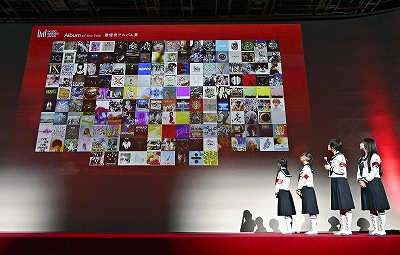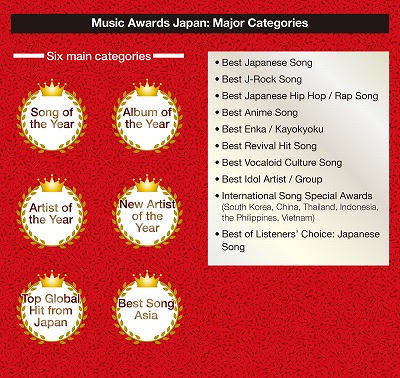Music Awards Japan Ready to Make Noise; Atarashii Gakko! Help Inaugurate Japan’s Answer to The Grammy Awards

Music Awards Japan entries are announced on March 21.
12:15 JST, April 18, 2025
Japan’s answer to the Grammy Awards will be launched this spring. Music Awards Japan (MAJ) will be the largest-scale international music awards ceremony in the country. The awards will honor artists and songs in 62 categories, which will be voted on by about 5,000 members of the music industry in a voting system similar to that of the Grammys.
So, in a nutshell, what is the aim of MAJ?
On March 13, the entries were announced in Tokyo. Of the six main categories, the “Top Global Hit from Japan” category included a wide range of songs, from recent mega-hits like “Idol” by Yoasobi, Miki Matsubara’s “Mayonaka no Doa” (Midnight door), released in 1979, and “Hatachi no Koi” (Cherry blossom love), by the independent-label band Lamp.
“There are so many songs you haven’t come across yet. I hope the awards will encourage people in other countries to pay closer attention to the culture and the music scene in Japan,” Rin, a member of the band Atarashii Gakko!, said.

Members of Atarashii Gakko! pose for a photo, each making the letter “M” with their hands, at an event to announce the entries for the inaugural Music Awards Japan.
MAJ is run by the Japan Culture and Entertainment Industry Promotion Association (CEIPA), a general incorporated association founded by five organizations, including the Recording Industry Association of Japan (RIAJ). For the inaugural event, songs that ranked on the hit charts between February last year and January this year were eligible for awards. About 5,000 music industry figures, including musicians, record company staff members and music critics, are expected to submit their votes. In addition to the main categories, award winners will be selected from a broad range of other categories, such as “Best Japanese Song” and “Best Anime Song.” There will also be awards voted on by general music listeners.
A preliminary voting process was held to pick the nominees for each category from the 3,000 songs on the entry list.
Final voting is taking place through April 30, and the winners will be announced during the award ceremony at Rohm Theatre Kyoto in Kyoto on May 21 and 22.
Japan already has several well-known music awards, including the Japan Record Awards, which are voted on by music reporters and critics, and the Japan Gold Disc Award, which are based on CD sales and streaming numbers. MAJ is different from them in that it is aimed at increasing awareness of Japanese music overseas.
“The growth and expansion of streaming services have increased opportunities for Japanese artists to create passionate fans overseas,” said CEIPA board chair and RIAJ chairman Shunsuke Muramatsu when the announcement of launching MAJ was made in October 2024. “I hope Japanese music will become a culture we can boast about to the world.”
Diversity of J-pop
According to Noriko Ashizawa, the head of music planning and operations at Spotify Japan, the number of songs by Japanese artists played overseas increased by 40% from 2022 to 2024. The increase was particularly notable among young people in the United States and Asian countries. The number of Japanese songs that were streamed more than 100 million times on Spotify grew to more than 100 between 2023 and 2024. In 2020, only three Japanese songs were streamed more than 100 million times on Spotify.

Japanese songs listened to overseas apparently have been broadly classifiable into three categories — anime-related songs, songs that have gone viral on TikTok and songs born in the cyber culture connected to the Vocaloid voice synthesizer.
Anime-related songs have become popular overseas because anime streaming platforms have spread on a global scale, making it possible for many anime shows to be viewed worldwide. TikTok songs becoming big sensations is not just a Japanese trend but a global one.
A case in point is “Shinunoga E-Wa” (Dying is okay) by Fujii Kaze, which first created a buzz on TikTok in Thailand in 2022 before going viral worldwide and has been played more than 660 million times.
The most notable example of a Vocaloid-derived song going big is Yoasobi’s “Yoru ni Kakeru” (Into the night). The song is performed by the duo Yoasobi and was produced by one of the members, who is also a Vocaloid producer. Vocaloid producers, also called Vocalo-P, initially did not expect humans to sing their songs, which led to the birth of a new music culture through the creation of characteristic melodies and music videos with animation.
“The reality is that J-pop, which was created to develop the domestic market, is quite diverse and attracts people from all over the world,” Ashizawa said. “Since MAJ includes a number of awards in specialized categories, I hope it will shed light on Japanese music by showing off its diversity to the world.”
Top Articles in Culture
-

BTS to Hold Comeback Concert in Seoul on March 21; Popular Boy Band Releases New Album to Signal Return
-

Director Naomi Kawase’s New Film Explores Heart Transplants in Japan, Production Involved Real Patients, Families
-

Tokyo Exhibition Offers Inside Look at Impressionism; 70 of 100 Works on ‘Interiors’ by Monet, Others on Loan from Paris
-

Traditional Japanese Silk Hakama Tradition Preserved by Sole Weaver in Sendai
-

Japanese Byobu Folding Screens Tailored to Meet Modern Lifestyles; Foreign Orders Also Piling up
JN ACCESS RANKING
-

Producer Behind Pop Group XG Arrested for Cocaine Possession
-

Japan PM Takaichi’s Cabinet Resigns en Masse
-

Man Infected with Measles Reportedly Dined at Restaurant in Tokyo Station
-

Israeli Ambassador to Japan Speaks about Japan’s Role in the Reconstruction of Gaza
-

Videos Plagiarized, Reposted with False Subtitles Claiming ‘Ryukyu Belongs to China’; Anti-China False Information Also Posted in Japan
























